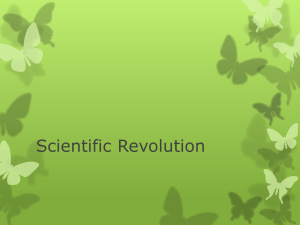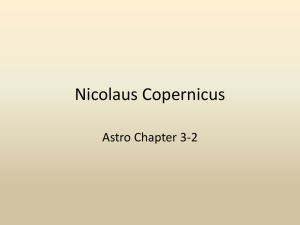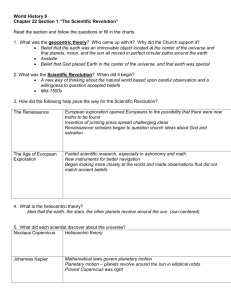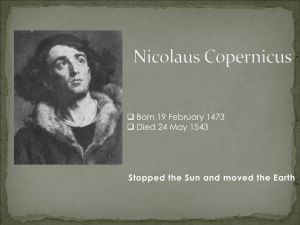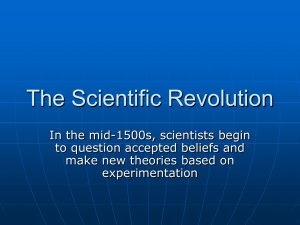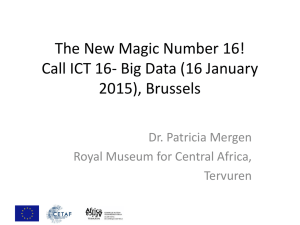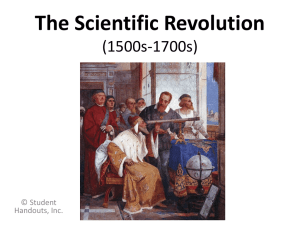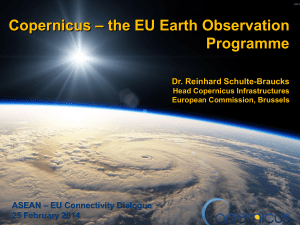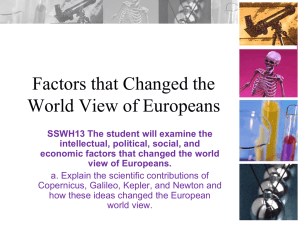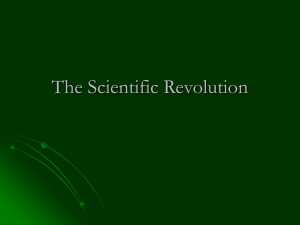Nicolaus Copernicus was a Polish astronomer.
advertisement
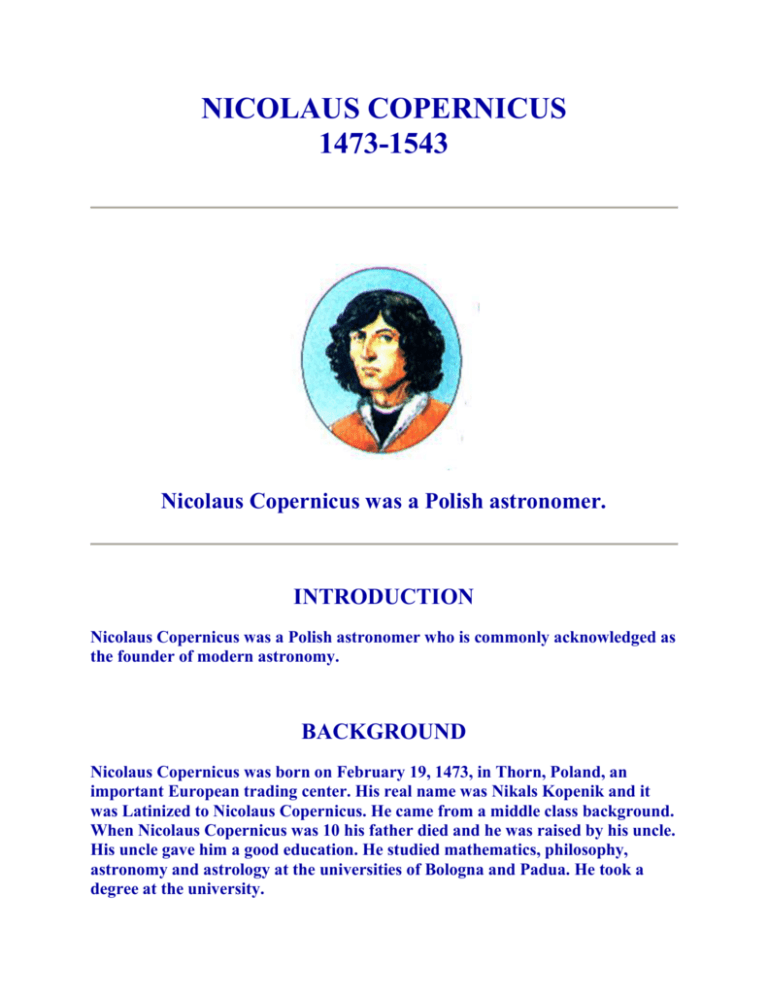
NICOLAUS COPERNICUS 1473-1543 Nicolaus Copernicus was a Polish astronomer. INTRODUCTION Nicolaus Copernicus was a Polish astronomer who is commonly acknowledged as the founder of modern astronomy. BACKGROUND Nicolaus Copernicus was born on February 19, 1473, in Thorn, Poland, an important European trading center. His real name was Nikals Kopenik and it was Latinized to Nicolaus Copernicus. He came from a middle class background. When Nicolaus Copernicus was 10 his father died and he was raised by his uncle. His uncle gave him a good education. He studied mathematics, philosophy, astronomy and astrology at the universities of Bologna and Padua. He took a degree at the university. ACCOMPLISHMENTS Nicolaus Copernicus was a true Renaissance man. He also was a lawyer, tax collector, a doctor, military governor, judge, vicar-general of canon law and a Polish astronomer. Nicolaus Copernicus said that the earth was not stationary. He also said the earth turned on its axis once a day and he doubted the earth lay in the middle of the universe. He claimed that the sun was the center of the universe and all the planets revolved around the sun. He also published a book on the revolution of the heavenly bodies. His book De Revolutions was his most famous piece of work. IMPACT Nicolaus Copernicus's knowledge was spread to others and he also set the scene for major advances in science. Copernicus also marked the beginning of a scientific revolution and astronomy. This was how Copernicus saw the universe. BIBLIOGRAPHY 1. "Bob's Backgrounds," [http://204.234.22.1/hot_graphics/back.htm]. 2. Gingerich, Owen [http://www.Copernicusmarketing/com/ret/nivocper.htm]. 3. Marks, Anthony. The Usborne Book of Scientists. Toronto, Scholastic, 1996, pp, 14-15. 4. "Nicolaus Copernicus," Grolier Electronic Publishing, Inc., 1995. 5. "Unusual Backrounds" [http://www.tribenet.com/unusual.htm]. RENE DESCARTES 1596-1650 "I think, therefore I am." INTRODUCTION Rene Descartes was one of the greatest philosophers of the Renaissance period. BACKGROUND Rene Descartes was born on March 31, 1596, in a small town in France called La Haye. He attended the college of Henri IV in La Fleche at the age of 10 and he left La Fleche in 1614 to study civil and cannon law at Poitiers. He received baccalaureate and licentiate degrees in law in 1616, and in 1618 he joined the army of Prince Maurice. Between 1628 and 1649 he led a quiet scholarly life. He produced most of his philosophical writings within this period. Rene Descartes died in Sweden in the year 1650. ACCOMPLISHMENTS Rene Descartes was a respected philosopher, scientist and mathematician. He used new methods of investigating nature and he invented analytic geometry. He was the first philosopher to describe the physical universe in terms of matter and motion. He created three major works: Discourse on Method, Meditations on First Philosophy, and Principles of Philosophy. He claimed that the world was created by God and that it was made of two substances: matter and spirit. Matter was the physical universe and spirit was the human mind. He considered that perhaps God or an evil spirit was constantly tricking his mind causing him to believe what was false. His theories of knowledge and of the relation between mind and matter influenced many later philosophers. IMPACT Rene Descartes is considered the father of modern philosophy. Philosopher, Scientist, Mathematician GALILEO GALILEI 1564-1642 Galileo was the greatest scientist who ever lived. INTRODUCTION For the last four hundred years, Galileo has fascinated and inspired writers, theologians, playwrights, historians and scientists. BACKGROUND Galileo was born February 15, 1564, in Pisa. He started school in the 1570's. Then after, he attended the University of Pisa. He asked his father if he could leave the university. He took courses in astronomy on the basis of the Greek astronomer Ptolmey's theory. In 1610 he went to Florence to continue his studies of the heavens where he found the truth of Copernicus's theory. In 1632 he published an important book of the dialogues concerning the two chief world systems of Ptolemy and Copernicus. In 1633 the church told him that he was wrong. He refused to say he was wrong and was sentenced to be imprisoned but the sentence changed to house arrest. He spent the remaining years in a country house under arrest where he was watched closely but was allowed to continue his scientific work. In 1630 he became blind after completing his second major book of dialogues concerning the two new sciences. The book was smuggled to Holland where it was published in 1639. Galileo was 78 years old when he died in 1642. IMPACT Galileo was one of the chief founders of modern science. His greatest impact was his telescope and the laws of motion. It changed the way people viewed the universe. This is the telescope that Galileo created in 1601. GERARDUS MERCATOR 1518 - 1594 Renaissance mapmaker INTRODUCTION Gerhard Kremer, or Gerardus Mercator was the leading mapmaker of the 15th Century. BACKGROUND Gerardus Mercator was born March 5, 1518, in Dumpelunde, Flanders (Belgium). He died Dec. 2, 1594, in Duisburg, Duchy of Cleve (Germany). His original name was Gerard de Kremer. Gerardus's father was a shoemaker in Flanders. He was educated at Shertogenbosch located in the Netherlands. In 1530 he entered the University of Levine where he studied philosophy. He later graduated after studying mathematics. After school he studied astronomy privately. He also travelled to a number of places (including Antwerp and Mechelen) while going through a personal crisis. Mercator returned to Levine where he studied mathematics. He spent seven months in jail but was released, mainly due to strong support from the University of Levine. In 1552 he moved to Duisburg where he opened a cartographic workshop. ACCOMPLISHMENTS Mercator's disciplines were cartography and geography. From 1535-1536 Mercator made terrestrial globes for several rich individuals. In 1537 Mercator constructed a globe of the stars. He was the first to use longitude and latitude for sailors. Mercator was also very good at making an accurate map of Western Europe. Later Mercator lectured at Duisburg where he took some time off to make Mercator's Great Atlas in which he sought to describe the world's history. He was the first to make a map of the British Isles. He was an instrument maker and engraver. He made the first map of Flanders. He made maps with a new type of projection. IMPACT His many maps and globes increased trade and exploration and people's knowledge of the world. Mercator's map of the world, 1538
